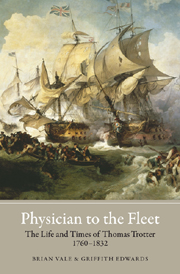Book contents
- Frontmatter
- Contents
- List of Illustrations
- List of Abbreviations
- Foreword
- Preface
- Background
- From Surgeon's Mate to Physician to the Fleet
- 3 HMS Berwick
- 4 Surgeon of a Slaver
- 5 Northumbrian Interlude
- 6 Recalled to the Colours
- 7 The Royal Hospital, Haslar
- 8 Physician to the Channel Fleet
- 9 The Conquest of Scurvy
- 10 Shore-Based in Plymouth
- 11 Honours and Half-Pay
- The Newcastle Years
- Bibliography
- Index
5 - Northumbrian Interlude
from From Surgeon's Mate to Physician to the Fleet
Published online by Cambridge University Press: 12 September 2012
- Frontmatter
- Contents
- List of Illustrations
- List of Abbreviations
- Foreword
- Preface
- Background
- From Surgeon's Mate to Physician to the Fleet
- 3 HMS Berwick
- 4 Surgeon of a Slaver
- 5 Northumbrian Interlude
- 6 Recalled to the Colours
- 7 The Royal Hospital, Haslar
- 8 Physician to the Channel Fleet
- 9 The Conquest of Scurvy
- 10 Shore-Based in Plymouth
- 11 Honours and Half-Pay
- The Newcastle Years
- Bibliography
- Index
Summary
IN 1784, Thomas Trotter was twenty-four years old with four years sea-going experience as a naval surgeon, spent in a variety of climates and conditions. He had learnt much about the practical elements of his profession, and had begun to develop clear and novel views on the genesis and treatment of that greatest of all eighteenth-century maritime scourges, scurvy. Applying observation in true Enlightenment fashion, he doubted the prevailing explanation that the cause of the disease lay in putrefaction. He had witnessed the effects of fresh vegetables and citrus fruits in the Channel, the West Indies and the North Sea while on Berwick, and had seen their benefits confirmed on the unhappy slaves of the Brookes. He had taken careful note of all the evidence and was anxious to present it to the medical professors in Edinburgh and develop his ideas more widely in a book on the subject.
Trotter was also anxious to resume the academic study of medicine in order to master more deeply the current theories of disease, and to help him refine the raw material of his practical experience. The possession of a medical degree would also serve a practical purpose by raising the lowly status he enjoyed as a surgeon, and giving him the social prestige and academic credibility associated with being a physician. To achieve these ambitions, and be within easy reach of the great University of Edinburgh, Trotter left Liverpool and headed back to the north country.
- Type
- Chapter
- Information
- Physician to the FleetThe Life and Times of Thomas Trotter, 1760–1832, pp. 69 - 77Publisher: Boydell & BrewerPrint publication year: 2011



